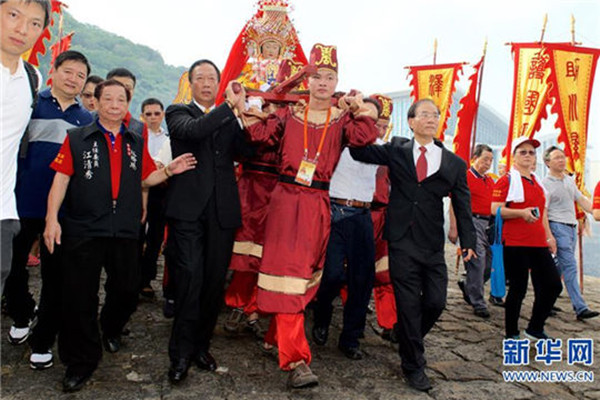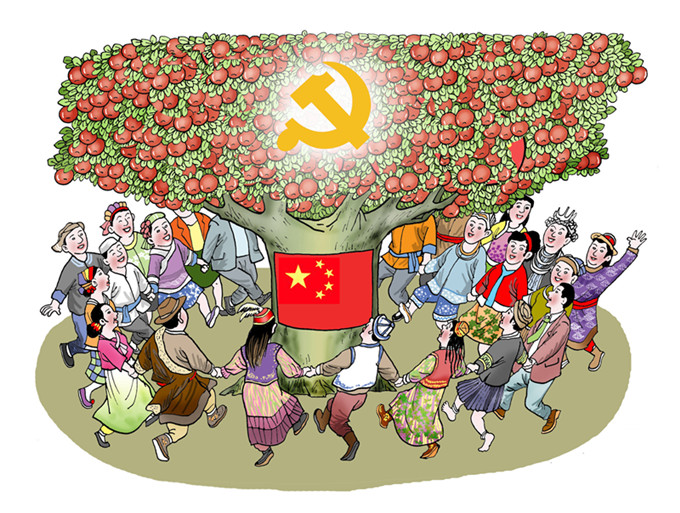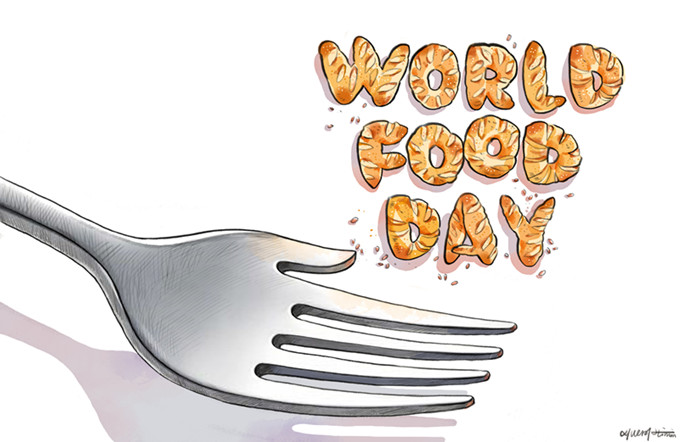Taiwan integral to national rejuvenation
 |
|
A grand parade is held in Meizhou in South China's Fujian province to escort the golden statue of Matsu to start its tour of Taiwan on Sept 23. [Photo/Xinhua] |
For more than a century, compatriots on both sides of the Taiwan Straits have shared the pursuit of the great rejuvenation of the Chinese nation. With the task of realizing that goal entering a crucial stage, the Chinese mainland and Taiwan have every reason to deepen their fruitful interaction of the past more than three decades while playing their part in realizing the Chinese Dream.
Taiwan compatriots have been and will always be an indispensable part of the rise of the Chinese nation, a centennial pursuit that is gaining momentum thanks to the shining economic performances of the mainland and Taiwan.
Summarizing the achievements of the past five years, Xi said: "We have upheld the one-China principle and the 1992 Consensus, promoted the peaceful development of cross-Straits economic and cultural exchanges and cooperation, and held a historic meeting between the leaders of the two sides."
In fact, the mainland remains the largest trading partner and export destination of Taiwan. Last year, cross-Straits trade reached 1.19 trillion yuan ($180 billion), and the bulk of that was Taiwan's exports to the mainland (920.4 billion yuan), which accounted for nearly half of the island's total exports.
A massive amount of Taiwan capital and technologies have been invested in the mainland's reform and opening-up drive for over three decades. In the early 1990s both sides reached the momentous 1992 Consensus that centers on the one-China principle and lays the political foundation for cross-Straits exchanges. The resumption of the "three direct links" of trade, transport and postal services after Kuomintang regained the leadership of the island in 2008, along with a series of cooperative deals, marked a new high in cross-Straits ties and helped boost the rise of the Chinese nation.
Suffice it to say that the participation of Taiwan compatriots in the mainland's reform and opening-up and cross-Straits stability are vital to the great rejuvenation efforts. Millions of Taiwan compatriots are working and living on the mainland, and more are expected to follow in their footsteps as the mainland is promulgating policies to make it easier for them to do so. They are not just participants in and beneficiaries of the rise of the Chinese nation but also potential contributors to further cross-Straits interaction.
That serves as solid evidence of the island's economic and industrial dependence on the mainland market, and of the deepened cross-Straits economic interaction that plays a key part in the island's well-being.
Taiwan cannot be absent from the Chinese Dream nor will it prosper without the mainland, as more than three decades of cross-Straits interaction has consolidated the bond between the two sides to a point where any attempt to sever it would backfire.
As Xi said in his report, we must "encourage fellow Chinese on both sides to oppose all separatist activities and work together to realize Chinese national rejuvenation". Therefore, the Tsai Ing-wen "administration" in Taiwan should partake in the national rejuvenation process instead of trying to sever the island's ties with the mainland.
The author is a professor at the Institute of Taiwan Studies, Beijing Union University.
- Fujian delegation to 19th CPC National Congress discuss report
- Delegations to 19th CPC National Congress discuss report
- The 19th CPC National Congress - Zhejiang focus
- CPC delegate leads impoverished village to enrichment
- Xi vows resolve, ability to defeat 'Taiwan independence'
- Think tank raises forecast for Taiwan 2017 economic growth
- Integrated development between Chinese mainland and Taiwan is possible, professor says

























